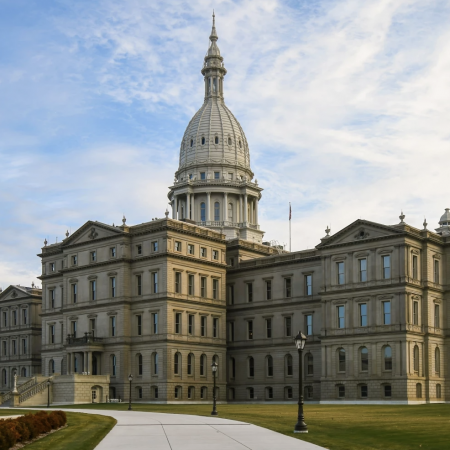Groups organizing ballot campaign to ban utility PAC campaign donations
A ballot campaign plans to launch in July to ask voters to ban political donations from committees affiliated with utility monopolies and from businesses with substantial state contracts.
A coalition of progressive organizations are behind the campaign for a voter-initiated law to reign in the influence of utilities and insurance companies with market dominance as well as contractors that do more than $250,000 in business annually with the state, which would appear to include Blue Cross Blue Shield of Michigan — a prolific political donor.
“This isn’t just another policy tweak,” said Sean McBrearty, Michigan director for Clean Water Action, one of the groups backing the proposal. “It’s a line in the sand. We want to stop corporations from buying off our democracy.”
The Michiganders for Money Out of Politics campaign said Consumers Energy and DTE Energy, in particular, have used their clout to fend off efforts to award bigger paybacks to customers for power losses.
“One of the biggest reasons we don’t see progress in Lansing is because too many politicians are bought and paid for,” said Ken Whittaker with Michigan United. “The political will to fix this mess just isn’t there, but that’s by design. We’re not new to this.”
The campaign needs to collect almost 357,000 signatures of registered voters to qualify for the 2026 ballot. They said the signature-gathering effort will be all-volunteer without using circulators who are paid by the signature. They say the specific language will be revealed closer to having it approved by the Michigan Board of State Canvassers.
But they say it will be very similar to legislation that has stalled in the Legislature already.
The campaign said utility influence has held back reforms that would improve service and make rates more affordable. Spokespersons for two large Michigan utilities said their companies behave ethically. They said donation decisions are made independently by political action committees run by employees and shareholders.
Statements from Consumers Energy and DTE Energy said they and their corporate political action committees strictly abide by existing campaign finance laws. DTE spokesperson Ryan Lowry noted the utility agreed to publicly disclose all political donations of $5,000 or more as part of a 2023 rate settlement agreement with the Michigan Public Service Commission.
Lowry also said political action committee decisions are made by employees and shareholders.
“These disclosures showcase DTE’s commitment to our customers and communities we serve, helping us meet our aspiration of being best in the world and best for the world,” he said in an emailed statement. “The political contributions the company makes are supported by the DTE voluntary employee PAC or DTE shareholders — not from customer revenue.”
Trusted, accurate, up-to-date.
WDET strives to make our journalism accessible to everyone. As a public media institution, we maintain our journalistic integrity through independent support from readers like you. If you value WDET as your source of news, music and conversation, please make a gift today.Donate today »
The post Groups organizing ballot campaign to ban utility PAC campaign donations appeared first on WDET 101.9 FM.
